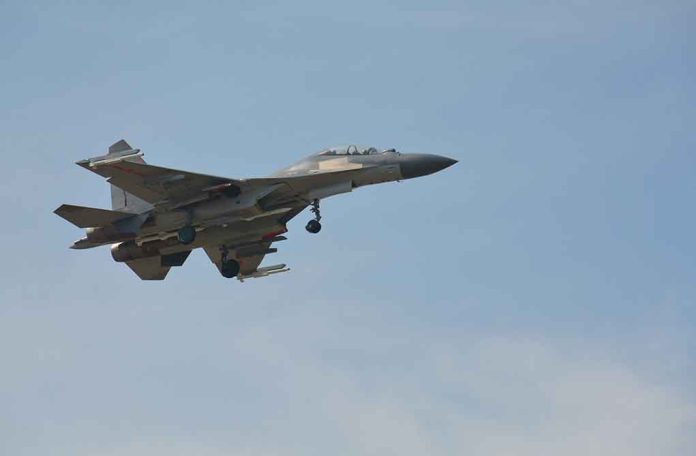
Japan says it fired warning flares at a Russian military plane after a stunning military airspace violation.
At a Glance
- A Russian military patrol aircraft allegedly violated Japanese airspace near Hokkaido three times on Monday.
- Japan’s Self-Defense Force fired warning flares for the first time in “an anti-airspace violation action.”
- The incident occurred amid heightened tensions and increased military cooperation between Russia and China.
- Japan strongly protested to Russia via diplomatic channels, demanding preventive measures.
Russian Incursion into Japanese Airspace
A Russian military patrol aircraft allegedly violated Japanese airspace near Hokkaido’s Rebun Island on multiple occasions this week. The incident, which reportedly occurred on Monday, prompted an unprecedented response from Japan’s Self-Defense Force (SDF), marking the first time they have fired warning flares in “an anti-airspace violation action,” per a government spokesperson.
Japan alleges the Russian Il-38 maritime patrol and anti-submarine warfare aircraft breached Japanese airspace north of Rebun Island three times, with each encroachment lasting between 30 seconds to one minute. Japan’s national airspace includes the airspace above its territorial seas, which extends up to 12 nautical miles from the country’s baseline.
Japan says Russian patrol aircraft violated its airspace https://t.co/8wSO0XYrIc pic.twitter.com/Tpqu5c0hlX
— Reuters World (@ReutersWorld) September 23, 2024
Japan’s Swift and Decisive Response
Japan’s reaction to the airspace violation was swift and decisive. The SDF dispatched F-15 and F-35 fighter jets to intercept the Russian aircraft. After issuing radio warnings during the first two incursions, the SDF pilots fired warning flares during the third violation, signaling a significant escalation in Japan’s response to such provocations.
Defense Minister Minoru Kihara emphasized the gravity of the situation, stating that the airspace violation was “extremely regrettable.” The Japanese government has lodged a strong protest with Russia through diplomatic channels, demanding immediate preventive measures to avoid future incidents.
Heightened Regional Tensions
This incident occurs against a backdrop of increasing military activity in the region. Japan has been closely monitoring the movements of both Russian and Chinese forces, with Japanese defense officials expressing concern over the growing military cooperation between the two nations. The alleged airspace violation coincided with the passage of nine Russian and Chinese warships through the La Perouse Strait for exercises in the Sea of Okhotsk.
Japan’s vigilance has been intensifying, with the country scrambling jets nearly 669 times between April 2023 and March 2024, primarily in response to Chinese military aircraft. This recent Russian incursion reportedly marks the first such violation since June 2019, bringing the total number of reported Soviet and Russian airspace violations to 44.
Implications for Regional Security
This incident occurred near the same time as Japanese Prime Minister Fumio Kishida’s meeting with Ukraine’s President Volodymyr Zelensky in New York. Japan has been a strong supporter of Ukraine, providing substantial material and financial aid, including $4.5 billion this year alone. This show of support for Ukraine may have influenced Russia’s decision to test Japan’s air defenses.
As tensions continue to simmer, Japan has made it clear that it will not hesitate to use similar measures in the future to protect its sovereignty. Kihara stated unequivocally, “We will carry out our warning and surveillance operations as we pay close attention to their military activities. We plan to use it without hesitation.”
With ongoing territorial disputes between Russia and Japan over islands near Hokkaido seized by the Soviet Union during World War II, and the increasing military cooperation between Russia and China, this incident serves as a stark reminder of the fragile balance of power in the region. As nations continue to assert their interests, the international community will be watching closely to see how this delicate situation unfolds in the coming weeks and months.
Sources
- Japan says Russian patrol aircraft violated its airspace
- Japanese jets fire warning flares to make Russian plane leave its airspace after unprecedented violation
- Japan scrambles fighter jets, fires flares at Russian spy aircraft in a first

















